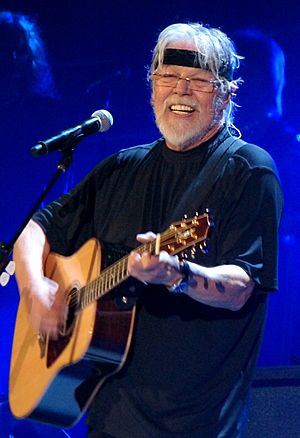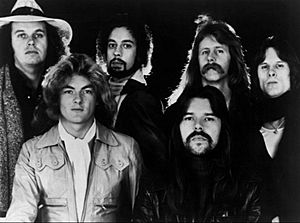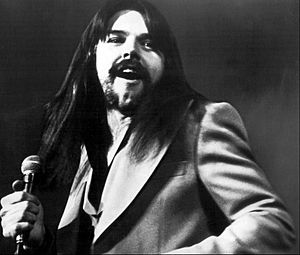Bob Seger facts for kids
Quick facts for kids
Bob Seger
|
|
|---|---|

Seger performing in Fargo, North Dakota, in 2013
|
|
| Background information | |
| Birth name | Robert Clark Seger |
| Born | May 6, 1945 Detroit, Michigan, U.S. |
| Genres |
|
| Occupation(s) |
|
| Instruments |
|
| Years active |
|
| Labels | |
Robert Clark Seger (born May 6, 1945) is a famous American singer, songwriter, and musician. He is now retired. Bob Seger became well-known in the Detroit area in the 1960s. He played with bands like Bob Seger and the Last Heard and the Bob Seger System.
His first big national hit was "Ramblin' Gamblin' Man" in 1969. In 1973, he formed The Silver Bullet Band. This group helped him become very successful across the country. Their live album Live Bullet (1976) and studio album Night Moves (1976) made him a star.
Bob Seger is known for his strong, raspy voice. He is a key artist in heartland rock music. His songs often talk about love, women, and the lives of working people. Some of his biggest hits include "Night Moves", "Turn the Page", "Still the Same", and "Like a Rock". His song "Shakedown" was a number-one hit in 1987.
Bob Seger has sold over 75 million records worldwide. This makes him one of the best-selling music artists ever. He was added to the Rock and Roll Hall of Fame in 2004. In 2012, he joined the Songwriters Hall of Fame. Bob Seger's final tour happened in 2018 and 2019.
Contents
Early Life and Musical Beginnings
Bob Seger was born in Detroit, Michigan. When he was five, his family moved to Ann Arbor. His father was a medical technician who played several instruments. This meant Bob grew up around music.
When Bob was 10, his father left the family. This made things financially tough for his family. Bob went to Tappan Junior High School and graduated from Ann Arbor High School in 1963. He also spent some time at Lincoln Park High School.
Bob Seger's first musical heroes were Little Richard and Elvis Presley. The first record he ever bought was "Come Go with Me" by The Del-Vikings in 1957.
Becoming a Local Star: 1961–1976
First Bands and Recordings
Bob Seger started his music career in 1961. He led a band called The Decibels. They recorded a demo song called "The Lonely One". This was Bob's first original song and his first to be played on the radio.
After The Decibels, Bob joined The Town Criers. This band played cover songs and gained many fans. Bob was influenced by James Brown and The Beatles. He and his friend Glenn Frey (who later joined the Eagles) wanted to make songs that would be popular on the radio.
Bob then joined Doug Brown & The Omens. He sang on their 1965 single "TGIF". He also met his future manager, Edward "Punch" Andrews, while with The Omens. Punch helped local bands and had a small record label.
The Last Heard and The Bob Seger System
In 1966, Bob Seger decided to record his own song, "East Side Story". He formed Bob Seger and the Last Heard. This song became a big hit in Detroit. It led to a contract with Cameo-Parkway Records.
The band released more singles, including "Heavy Music" in 1967. This song was very popular and could have been a national hit. But Cameo-Parkway Records went out of business.
In 1968, Bob Seger & the Last Heard signed with Capitol Records. Capitol changed the band's name to The Bob Seger System. Their first single, "2 + 2 = ?", was an anti-war song. It was a hit in Detroit.
Their second single, "Ramblin' Gamblin' Man", became Bob's first national hit. It reached number 17 on the charts. The album Ramblin' Gamblin' Man (1969) also did well. Glenn Frey sang backup on this album.
The next album, Noah (1969), did not do as well. Bob briefly left music to go to college. He returned in 1970 with the band's last album, Mongrel. This album was liked by critics but did not sell much.
Solo Work and New Bands
After The System broke up, Bob Seger released a solo acoustic album, Brand New Morning (1971). It was not a commercial success.
He then worked with the duo Teegarden & Van Winkle. They recorded Smokin' O.P.'s (1972). This album had some cover songs and a new original, "Someday".
In 1973, Bob released Back in '72. He recorded some songs with the famous Muscle Shoals Rhythm Section. This album included the studio version of "Turn the Page". This song later became a live classic.
Forming The Silver Bullet Band
In 1974, Bob Seger formed The Silver Bullet Band. The original members were Drew Abbott (guitar), Charlie Allen Martin (drums), Rick Manasa (keyboards), Chris Campbell (bass), and Alto Reed (saxophone).
With this new band, Bob released Seven (1974). It had the hard-rock hit "Get Out of Denver". In 1975, he released Beautiful Loser. The song "Katmandu" from this album was his first big national song since "Ramblin' Gamblin' Man".
In April 1976, Bob Seger and the Silver Bullet Band released Live Bullet. This album was recorded live in Detroit. It featured "Turn the Page" and other popular songs. Live Bullet became a huge seller in Detroit and gained attention across the country. It helped Bob Seger become a headliner for concerts.
Reaching Superstardom: 1976–1987
Bob Seger became a huge star with his October 1976 album Night Moves. The song "Night Moves" was a big hit, reaching number 4 on the charts. The album also had "Mainstreet" and "Rock and Roll Never Forgets". Night Moves was Bob's first top-ten album and sold millions of copies. Its success also boosted sales of his earlier albums like Beautiful Loser and Live Bullet.
In 1978, the album Stranger in Town was also very successful. It included hits like "Still the Same" (number 4), "Hollywood Nights" (number 12), and the ballad "We've Got Tonight" (number 13). The song "Old Time Rock and Roll" from this album became even more famous after being in the movie Risky Business. It is now one of the most played jukebox songs ever.
Bob Seger also helped write the Eagles' number-one hit "Heartache Tonight" in 1979.
In 1980, Bob released Against the Wind. This album became his only number-one album on the Billboard charts. It featured hit singles like "Fire Lake" and "Against the Wind". This album also won two Grammy Awards.
The live album Nine Tonight (1981) showed how popular Bob Seger was at this time. It included his hit version of "Tryin' to Live My Life Without You".
In 1982, Bob released The Distance. This album had a different sound and produced several hits. "Shame on the Moon" was a huge hit, reaching number 2 on the Hot 100 chart. "Roll Me Away" also did well.
Bob Seger wrote and recorded "Understanding" for the movie Teachers in 1984. It was a Top 20 hit.
His next studio album, Like a Rock, came out in 1986. The song "American Storm" was a Top 20 hit. The title song, "Like a Rock", reached number 12. This song later became famous from Chevrolet car commercials. Bob Seger's 1986–1987 American Storm Tour was his last major tour.
In 1987, Bob Seger & the Silver Bullet Band received a star on the Hollywood Walk of Fame. Also in 1987, Bob recorded "Shakedown" for the movie Beverly Hills Cop II. This song became his first and only number-one hit on the pop singles chart.
Later Career and Retirement: 1988–Present
Bob Seger released The Fire Inside in 1991 and It's a Mystery in 1995. While these albums did not have as many big hits, his Greatest Hits album in 1994 became his biggest seller ever, selling almost 10 million copies.
From 1997 to 2005, Bob took a break from music to spend time with his family. He was inducted into the Rock and Roll Hall of Fame in 2004.
His first new album in eleven years, Face the Promise, was released in 2006. It sold over a million copies, bringing Bob back to platinum status. The tour for this album sold out quickly.
In 2009, Bob released Early Seger Vol. 1, a collection of older songs. He also went on a successful tour in 2011. In 2012, he was inducted into the Songwriters Hall of Fame.
Bob Seger's 17th studio album, Ride Out, came out in 2014. He also went on a successful tour for this album. In 2017, he released the album I Knew You When.
On September 18, 2018, Bob Seger announced his final tour, called the Travelin' Man tour. The tour ended on November 1, 2019, and Bob Seger officially retired from touring. In 2023, he made a brief return to perform at the Country Music Hall of Fame.
Personal Life and Views
Bob Seger has been married three times. He married Juanita Dorricott in 1993, and they have two children.
Bob Seger describes his political views as "right down the middle." He has written songs about social issues like war and gun violence. He also wrote "It's Your World" about climate change. He believes everyone is responsible for helping the environment.
Discography
Studio albums
- Ramblin' Gamblin' Man (1969)
- Noah (1969)
- Mongrel (1970)
- Brand New Morning (1971)
- Smokin' O.P.'s (1972)
- Back in '72 (1973)
- Seven (1974)
- Beautiful Loser (1975)
- Night Moves (1976)
- Stranger in Town (1978)
- Against the Wind (1980)
- The Distance (1982)
- Like a Rock (1986)
- The Fire Inside (1991)
- It's a Mystery (1995)
- Face the Promise (2006)
- Ride Out (2014)
- I Knew You When (2017)
Live albums
- Live Bullet (1976)
- Nine Tonight (1981)
Compilation albums
- Greatest Hits (1994)
- Greatest Hits 2 (2003)
- Early Seger Vol. 1 (2009)
- Ultimate Hits: Rock and Roll Never Forgets (2011)
- Heavy Music: The Complete Cameo Recordings 1966–1967 (2017)
See also
 In Spanish: Bob Seger para niños
In Spanish: Bob Seger para niños
 | Stephanie Wilson |
 | Charles Bolden |
 | Ronald McNair |
 | Frederick D. Gregory |



